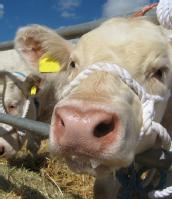Life Sciences News
See our Latest Journal Publications
Superbugs, stem cells and more at University of Warwick’s showcase of science
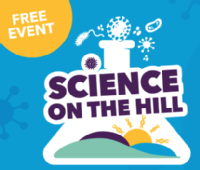 Whether you are fascinated by superbugs, stem cells, or circadian rhythms, a new programme of free events from the University of Warwick will give you the ideal vantage point on biological and medical science.'Science on the Hill' is a new programme of public engagement events jointly hosted by the School of Life Sciences and the Wellcome-Warwick Quantiative Biomedicine Programme at Warwick Medical School. These interactive two hour events taking place across the academic year will feature 20 researchers giving a birds-eye view of the latest exciting developments in their discipline.
Whether you are fascinated by superbugs, stem cells, or circadian rhythms, a new programme of free events from the University of Warwick will give you the ideal vantage point on biological and medical science.'Science on the Hill' is a new programme of public engagement events jointly hosted by the School of Life Sciences and the Wellcome-Warwick Quantiative Biomedicine Programme at Warwick Medical School. These interactive two hour events taking place across the academic year will feature 20 researchers giving a birds-eye view of the latest exciting developments in their discipline.
Over £20 million government award marks Midlands’ bio-economy strengths
A consortium of Midlands research-active universities has just been awarded research studentships worth over £20 million to build on the Midlands’ already significant bio-economy and success in life sciences and agricultural research.
The Midlands Integrative Biosciences Training Partnership 2020 (MIBTP2020) is led by the School of Life Sciences at the University of Warwick and brings together a number of other Warwick research departments, in partnership with the University of Birmingham, the University of Leicester, Aston University and Harper Adams University. The funding comes from the Biotechnology and Biological Sciences Research Council arm of the Government’s UK Research and Innovation (UKRI) funding organisation. This award will be matched by the universities in the partnership to fund a total of 245 doctoral students (59 per year) over the next 5 years.
Tracking Alzheimer’s disease pathology in single neuronal cells
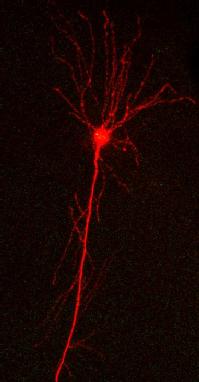 Researchers have developed a superior method to describe the very earliest effects that Alzheimer’s Disease proteins have on the properties of brain cells.
Researchers have developed a superior method to describe the very earliest effects that Alzheimer’s Disease proteins have on the properties of brain cells.
In the paper ‘Introduction of Tau oligomers into cortical neurons alters action potential dynamics and disrupts synaptic transmission and plasticity’ published in the journal eNeuro. Researchers directly identify new therapeutic targets and describe a new standard for future research activity.
Warwick rises a further two places to 77th in the THE World University Rankings
The University of Warwick has risen two places to 77th overall in the THE (Times Higher Education) 2019 World University Rankings published on the evening of Wednesday 11th September 2019. This rise is in addition to Warwick’s leap of a dozen places in the 2018 table.
National livestock movement bans may prove economically damaging
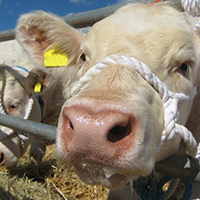 New research led by Dr Mike Tildesley has pioneered an economic perspective on controlling livestock diseases. Focusing on Foot and Mouth Disease (FMD), bovine TB (bTB) and bluetongue virus (BTV), the researchers draw striking conclusions about the role of movement bans in controlling an outbreak.
New research led by Dr Mike Tildesley has pioneered an economic perspective on controlling livestock diseases. Focusing on Foot and Mouth Disease (FMD), bovine TB (bTB) and bluetongue virus (BTV), the researchers draw striking conclusions about the role of movement bans in controlling an outbreak.
New awards target breakthrough technologies to enhance food security
A recent collaboration between the BBSRC, the National Science Foundation (NSF) and the US Department of Agriculture's National Institute of Food and Agriculture (NIFA) is helping researchers potentially advance technology that brings more security to crop agriculture of the future. Dr Stephen Jackson and Dr Jose Gutierrez-Marcos are amongst those receiving funding.
Warwick Ranked in UK Top 10 and World Top 100 by QS
The University of Warwick has been named as one of the UK’s top ten, and one of the world’s top 100, universities by the QS World University Rankings.
Bacteria such as E. coli detected in minutes by new technology
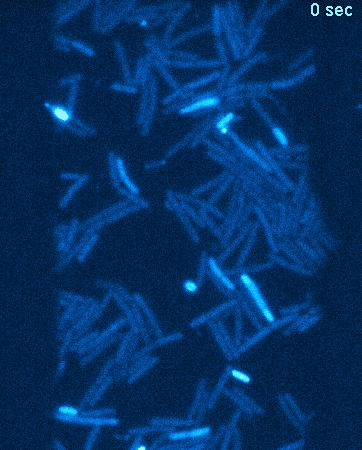 Dr Munehiro Asally, Dr James Stratford and colleagues, showed that bioelectrical signals from bacteria can be used to rapidly determine if they are alive or dead.
Dr Munehiro Asally, Dr James Stratford and colleagues, showed that bioelectrical signals from bacteria can be used to rapidly determine if they are alive or dead.
The findings offer a new technology which detects live bacteria in minutes instead of waiting for lab-test results which can take days.
When 'zapped' with an electrical field, live bacteria absorb dye molecules, causing the cells to light up and allowing them to be counted easily.
This rapid technique can detect antibiotic-resistant bacteria.
Beer and fodder crop has been deteriorating for 6000 years
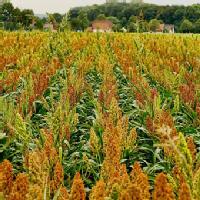 The diversity of the crop Sorghum, a cereal used to make alcoholic drinks, has been decreasing over time due to agricultural practice. To maintain the diversity of the crop and keep it growing farmers will need to revise how they manage it. According to Professor Allaby and colleagues, different groups of sorghums have ‘rescued’ each other from damage, giving insight into how such crops could be rescued in the future.
The diversity of the crop Sorghum, a cereal used to make alcoholic drinks, has been decreasing over time due to agricultural practice. To maintain the diversity of the crop and keep it growing farmers will need to revise how they manage it. According to Professor Allaby and colleagues, different groups of sorghums have ‘rescued’ each other from damage, giving insight into how such crops could be rescued in the future.
The milkweed bug’s orange wings and DNA: how insects’ diets are revealed by the genome
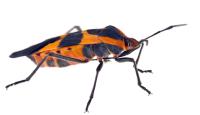 An international collaboration of researchers, including Dr Kristen Panfilio from the School of Life Sciences, have sequenced the genome of the milkweed bug, enabling scientists to understand at the molecular level what makes the bug, from its colourful development to its toxic diet.
An international collaboration of researchers, including Dr Kristen Panfilio from the School of Life Sciences, have sequenced the genome of the milkweed bug, enabling scientists to understand at the molecular level what makes the bug, from its colourful development to its toxic diet.
Salmonella could be combated by enhancing body’s natural process
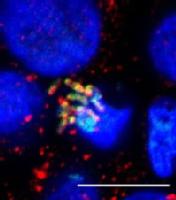 Autophagy – the process of recycling cellular material in the body, can help combat Salmonella and other pathogens according to Dr Ioannis Nezis and colleagues who have studied how autophagy can get rid of bacteria, and prevent diseases developing.
Autophagy – the process of recycling cellular material in the body, can help combat Salmonella and other pathogens according to Dr Ioannis Nezis and colleagues who have studied how autophagy can get rid of bacteria, and prevent diseases developing.
Man’s impact on flax evolution more limited than thought
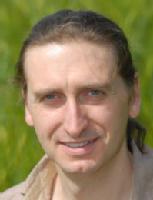 Flax naturally adapted to new environments rather than by human influence due to a set of genes that enable it to change its architecture according to research led by Professor Robin Allaby.
Flax naturally adapted to new environments rather than by human influence due to a set of genes that enable it to change its architecture according to research led by Professor Robin Allaby.
The evolution of Maize is more complex than thought
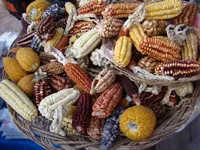 New evidence reveals that the evolution of Maize in South America is more complex than initially thought, and there was a further geographical area in which partial domestication occurred in the Southwest Amazon - according to an international collaboration of researchers including the University of Warwick, and published in the journal Science.
New evidence reveals that the evolution of Maize in South America is more complex than initially thought, and there was a further geographical area in which partial domestication occurred in the Southwest Amazon - according to an international collaboration of researchers including the University of Warwick, and published in the journal Science.
Crops can be grown in Arsenic contaminated soil without being poisonous
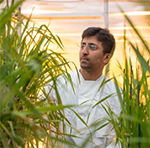 Researchers in Life Sciences are working on ways to contribute to developing safe crops which can be grown in As contaminated soil but reduce the amount of As going to the edible part.
Researchers in Life Sciences are working on ways to contribute to developing safe crops which can be grown in As contaminated soil but reduce the amount of As going to the edible part.
Researchers wake-up DNA from soil bacteria to discover novel acid antibiotic
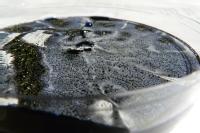 A team led by Dr Christophe Corre (SLS) and Dr Manuela Tosin (Chemistry) have characterised a new bioactive natural product whose derivatives could be used as antibiotics and help fight infections.
A team led by Dr Christophe Corre (SLS) and Dr Manuela Tosin (Chemistry) have characterised a new bioactive natural product whose derivatives could be used as antibiotics and help fight infections.
Arctic's Global Seed Vault to receive 101 samples from Warwick's Vegetable Genebank
101 seed samples from 18 different types of crop species including onions, carrots and cauliflower are to be deposited at the Svalbard Global Seed Vault in Arctic Norway on the 31 October 2018, from the UK Vegetable Genebank (UKVGB) at the University of Warwick.
UK scientists to join Arctic research ship 'drifting' past North Pole
 UK scientists will join what could be the largest-scale Arctic research expedition ever planned when the German research ship RV Polarstern is deliberately lodged into sea ice to drift past the North Pole. Research includes Dr Hendrik Schaefer of the University of Warwick’s School of Life Sciences.
UK scientists will join what could be the largest-scale Arctic research expedition ever planned when the German research ship RV Polarstern is deliberately lodged into sea ice to drift past the North Pole. Research includes Dr Hendrik Schaefer of the University of Warwick’s School of Life Sciences.
Image courtesy of Alfred Wegener Institute.
Real-time foot-and-mouth strategy to better fight disease
Professor Laura Green moving to University of Birmingham
Congratulations to Deputy Pro-Vice-Chancellor (interdisciplinary research and impact) and former Head of the School of Life Sciences, Professor Laura Green, who has been appointed to the role of Pro-Vice-Chancellor for Life and Environmental Sciences at the University of Birmingham. She will take up her new role on 1 October 2018.
Enzyme discovery could help in fight against TB
An enzyme structure discovery made by scientists at the University of Warwick could help to eradicate tuberculosis (TB).
Research by a team led by Dr Elizabeth Fullam, has revealed new findings about an enzyme found in Mycobacterium tuberculosis (Mtb) the bacterium that causes TB. TB causes more deaths than any other infectious disease, including from HIV and malaria.

